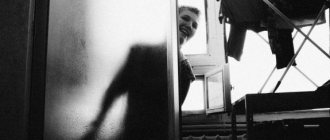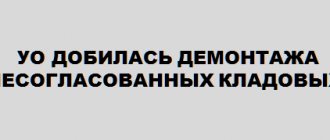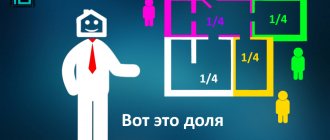What is common property in MKD
When a person buys an apartment in a multi-apartment building, he acquires not only the housing itself, but also part of the common property belonging to all residents.
This property includes:
- premises that are not parts of apartments and are intended to serve more than one residential or non-residential premises in a given building. These are inter-apartment landings, stairs, elevators, elevator and other shafts, corridors, strollers, technical floors, attics, basements with utilities, garbage chutes and garbage receptacles;
- roofs;
- enclosing load-bearing structures of the house. These are foundations, load-bearing walls, floor slabs, balcony and other slabs, load-bearing columns;
- enclosing non-load-bearing structures of a house serving more than one room. These are windows and doors of common areas, railings, parapets;
- mechanical, electrical, sanitary and other equipment (including to ensure unhindered access for people with disabilities) that serves more than one room;
- automated information and measurement systems for accounting for the consumption of utility resources and services, if they are installed at the expense of the owners of premises in the apartment building;
- the land plot on which the house is located, with elements of landscaping and landscaping, as well as other facilities located on this plot for the maintenance, operation and improvement of the house (transformer substations, heating points serving one house, collective parking lots, garages, children's and sports grounds in boundaries of the land plot). A land plot is included in the common property if its boundaries and size are determined in accordance with the requirements of land and town planning legislation;
- other premises in the house that do not belong to individual owners and are intended to meet the social and everyday needs of residents. These are premises intended for organizing leisure time, cultural development, children's creativity, physical education and sports, etc.
Common property in an apartment building belongs to the owners on the right of common shared ownership. The share is proportional to the size of the total area of the apartment.
Who organizes inspections and who takes part in them
General scheduled as well as unscheduled inspections are carried out by the organization managing the apartment building.
If the management company manages the house in which the HOA (residential complex, housing cooperative) has been created, then a representative of the HOA board must participate in the inspections. This is provided for in clause 2.1.2 of Rules No. 170.
Inspections of individual elements of apartment buildings that are serviced by specialized organizations must be carried out with the involvement of responsible employees of these organizations. For example, they must participate in the inspection of elevators, fire alarm systems, in-house gas equipment, and ventilation systems.
Note Application of Rules No. 170
Rules and regulations for the technical operation of housing stock, approved. Resolution of the State Construction Committee of Russia dated September 27, 2003 No. 170, must be observed despite the fact that they are officially applied on a residual basis.
The Ministry of Construction of Russia clarified that Rules No. 170 apply to the extent that they do not contradict current legislation (letter dated May 24, 2016 No. 19304-OG/04).
If the management agreement does not contain the obligation of the management company to perform work and provide services provided for by Rules No. 170, then they are of a recommendatory nature. The fact is that federal executive authorities have the right to issue only advisory acts in the field of technical regulation. This is determined by Part 3 of Art. 4 of the Federal Law of December 27, 2002 No. 184-FZ.
In practice, housing supervision authorities hold organizations managing apartment buildings administratively liable if they do not perform the work and services provided for by Rules No. 170. The organization can be fined up to 50 thousand rubles. according to Art. 7.22 Code of Administrative Offenses of the Russian Federation. The court will most likely support the position of the housing inspectorate. See, for example, decisions of the Supreme Court of the Russian Federation dated November 18, 2016 No. 307-AD16–10217 in case No. A26-10959/2015, dated November 30, 2015 No. 307-AD15–14917 in case No. A66-3331/2015.
Who should take care of common property?
Common property in an apartment building must be maintained in proper form:
- staircase landings must be clean;
- the equipment must work properly;
- The lights should be on and the motion sensors should be activated.
The property is in good condition, if it complies with sanitary and technical standards, it can be safely and comfortably used for its intended purpose.
Requirements for the condition of common property
- The property must meet the characteristics of reliability and safety
- Common property should not pose a threat to the life and health of citizens
- The person responsible for the condition of the common property must ensure access to residential and non-residential premises, common areas, as well as to the land plot (including for disabled people and other groups of the population with limited mobility)
- When using common property, the rights and legitimate interests of the owners of the premises must not be violated
- The person responsible for the condition of the common property must ensure the constant readiness of utilities, metering devices and other equipment included in the common property to provide utilities to residents of the apartment building
- In the case of construction or reconstruction of an apartment building, the architectural appearance of the building must comply with the design documentation
- The common property of apartment buildings must comply with the requirements of legislation on energy saving and increasing energy efficiency
Usually, to maintain the property in proper condition, residents create a homeowners' association (HOA) or enter into an agreement with a management organization (MA).
Also, owners with direct management can independently enter into agreements with specialized organizations. In addition, the developer has the right to maintain the property in proper condition if he did not transfer part of the premises to other persons after receiving permission to put the apartment building into operation, or the person who accepted the premises from the developer under the transfer deed.
What is included in the maintenance of common property*:
- inspection of common property to timely identify non-compliance of property with the requirements of the legislation of the Russian Federation, as well as threats to the safety of life and health of citizens;
- ensuring the readiness of in-house engineering power supply systems and electrical equipment to provide public electricity supply services;
- maintaining temperature and humidity in common property areas;
- cleaning of common areas and land plots as part of common property;
- collection and removal of liquid household waste, including waste from organizations and individual entrepreneurs using non-residential premises in apartment buildings;
- organization of places for accumulation and accumulation of used mercury-containing lamps, their transfer to specialized organizations that, under a license, work with waste of I-IV hazard classes;
- maintenance of municipal solid waste accumulation sites**;
- ensuring fire safety measures;
- maintenance of land plots with elements of landscaping and improvement;
- carrying out routine repairs, preparing for seasonal operation and maintaining common property, as well as landscaping elements on a land plot as part of common property;
- carrying out mandatory measures to save energy and improve energy efficiency;
- ensuring the installation and commissioning of common house metering devices for cold and hot water, thermal and electrical energy, natural gas, as well as their maintenance and verification of metering devices;
- purchase of cold and hot water, electrical energy for general house needs (GDN), as well as wastewater disposal.
* Depending on the composition, design features, degree of physical wear and technical condition of the common property, as well as depending on the geodetic and climatic conditions of the location of the apartment building.
** Does not include cleaning of municipal solid waste loading areas.
All owners of premises in an apartment building bear the burden of expenses for maintaining common property. The share of mandatory expenses for maintaining common property is also determined by the share in the right of common ownership of common property: the larger the area of the apartment, the higher the maintenance fee.
Responsibility for the safety of common property lies primarily with the property owners themselves, as well as the management organization they hired or the created HOA and local government bodies.
State Housing and Construction Supervision Service of the Irkutsk Region
29.08.2016
In accordance with paragraph 3 of part 5 of article 20 of the Housing Code of the Russian Federation, officials have the right to issue orders to stop violations of mandatory requirements and to eliminate identified violations.
In accordance with Part 1 of Art. 17 of the Federal Law of December 26, 2008 No. 294-FZ “On the protection of the rights of legal entities and individual entrepreneurs in the exercise of state control (supervision) and municipal control” (hereinafter referred to as FZ-294) in the event of detection of violations by a legal entity or individual entrepreneur during an inspection mandatory requirements or requirements established by municipal legal acts, officials of the state control (supervision) body, within the powers provided for by the legislation of the Russian Federation, are obliged to: issue an order to a legal entity or individual entrepreneur to eliminate identified violations, indicating the time frame for their elimination.
In accordance with Article 39 of the Housing Code of the Russian Federation, owners of premises in an apartment building bear the burden of expenses for maintaining common property in such a building.
Owners of premises have the right to both independently carry out actions for the maintenance and repair of common property, and to attract other persons to provide services and perform work on the maintenance and repair of common property, taking into account the chosen method of managing an apartment building.
According to subparagraph “a” of paragraph 10 of the Rules for the maintenance of common property in an apartment building, approved. By Decree of the Government of the Russian Federation dated August 13, 2006 No. 491 (hereinafter referred to as Rules No. 491), the common property of an apartment building must be maintained in accordance with the requirements of the legislation of the Russian Federation in a condition that ensures compliance with reliability and safety characteristics.
In accordance with paragraph 42 of Rules No. 491, management organizations and persons providing services and performing work in the direct management of an apartment building are responsible to the owners of the premises for violation of their obligations and are responsible for the proper maintenance of common property in accordance with the legislation of the Russian Federation and the contract.
Clause 2.1. Part 2 of Article 161 of the Housing Code of the Russian Federation, when directly managing an apartment building by the owners of the premises in this building, persons performing work on the maintenance and repair of common property in the apartment building are responsible to the owners of the premises in this building for the fulfillment of their obligations in accordance with the concluded agreements, as well as in accordance with the rules established by the Government of the Russian Federation for the maintenance of common property in an apartment building.
According to subparagraph 3 of paragraph 2 of Article 161 of the Housing Code of the Russian Federation, owners of premises in an apartment building are required to choose one of the methods of managing an apartment building, which may be the management of a management organization on the basis of an apartment building management agreement concluded with it in accordance with Article 162 of the Housing Code of the Russian Federation.
The management organization, on the instructions of the other party, the owners of premises in an apartment building, within an agreed period for a fee, undertakes to provide services and perform work on the proper maintenance and repair of common property in such a building, to provide utilities to the owners of premises in such a house and to persons using the premises in this building, carry out other activities aimed at achieving the goals of managing an apartment building (clause 2 of Article 162 of the Housing Code of the Russian Federation).
Based on Article 210 of the Civil Code of the Russian Federation, the owner bears the burden of maintaining the property he owns, unless otherwise provided by law or contract.
The contents mentioned in this article include the costs of current and major repairs, maintaining the property in working order. In a number of cases, the legislator provides for the transfer of the burden of maintaining property from the owner to other persons.
By virtue of Article 39 of the Housing Code of the Russian Federation, owners of premises in an apartment building bear the burden of expenses for maintaining common property in such a building. Rules for the maintenance of common property are established by the Government of the Russian Federation.
Decree of the Government of the Russian Federation dated August 13, 2006 No. 491 approved the Rules for the maintenance of common property in an apartment building. These Rules regulate relations regarding the maintenance of common property owned by the right of common shared ownership to the owners of premises in an apartment building.
Specific requirements for the maintenance of the housing stock are determined by the Rules and Standards for the Technical Operation of the Housing Stock, approved by Resolution of the State Construction Committee of the Russian Federation dated September 27, 2003 No. 170.
In addition, paragraph 10 of Rules No. 491 stipulates that the common property of the house must be maintained in accordance with the requirements of the legislation of the Russian Federation in a condition that ensures, along with other requirements, compliance with the reliability and safety characteristics of an apartment building; safety for the life and health of citizens, safety of property of individuals or legal entities, state, municipal and other property; compliance with the rights and legitimate interests of premises owners, as well as other persons.
Paragraphs 16 and 17 of the same Rules establish that when managing an apartment building through the involvement of a management organization, the proper maintenance of the common property of the apartment building is ensured by the owners by concluding a house maintenance agreement with such an organization, determining at a general meeting the list of services and works, the conditions for their provision and implementation, as well as the amount of funding.
Based on paragraph 42 of Rules No. 491, management organizations are responsible to the owners of premises for violation of their obligations and are responsible for the proper maintenance of common property in accordance with the legislation of the Russian Federation and the contract.
In turn, the requirements and standards for the maintenance and servicing of the housing stock are determined by Rules No. 170, which are mandatory for both property owners and management organizations.
In addition, Rule No. 170 lists what exactly should be included in the maintenance and maintenance of a house, and also indicates the parameters and conditions that, in order to ensure the safety of people and the safety of a residential building, the building structures of this house must in any case meet, regardless of the wishes of the owners of individual its premises and their inclusion of relevant works and services in the contract with the management company.
Based on the above norms of current legislation, the applicant, as a management organization, is obliged to provide favorable and safe living conditions for citizens, carry out actions for the maintenance and repair of common property or attract other persons to provide services and perform work on the maintenance and repair of such property.
In addition, from the resolution of the Presidium of the Supreme Arbitration Court of the Russian Federation dated September 29, 2010 No. 6464/10, it follows that all current, urgent, mandatory seasonal work and services are considered provided for in the contract due to the norms for maintaining the house as an object and must be carried out by management companies independently depends on whether the relevant specific actions are mentioned in the contract and whether there is a special decision on the need for their implementation by the general meeting of owners of the premises in the house.
The work that needs to be carried out to eliminate identified violations is mandatory for organizations managing apartment buildings.
Management organizations act in these relations as specialized commercial organizations that manage apartment buildings and this activity is their main activity and they bear the risk of liability.
How can you use common property?
By decision of the general meeting of owners (GMS), property in an apartment building can be transferred for use to other persons if this does not violate the rights and legitimate interests of citizens and legal entities. For example, you can rent out the premises to a store, a consumer services company, or a children's development center. In this case, all owners in the apartment building will be the lessors.
The owner of premises in an apartment building does not have the right to:
- to allocate in kind your share in the right of common ownership of common property in an apartment building;
- sell or lease your share in the right of common ownership of common property in an apartment building, as well as perform other actions entailing the transfer of this share separately from the right of ownership of the apartment;
- carry out work and perform other actions that cause damage or spoil public property;
- rearrange or change the layout of common areas without the consent of all residents and the availability of documents that permit this. For example, without a decision from the OSS, you cannot install an additional door in a common corridor, especially if it impedes access to firefighting equipment.



